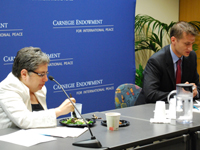Registration
You will receive an email confirming your registration.
Weeks after the June outbreak of violence in the South, Kyrgyzstan remains gripped by instability and uncertainty regarding issues ranging from rebuilding in the South, to the upcoming October 10th parliamentary election. There is a strong potential for continued conflict in the country if these issues are not addressed.
Following his recent trip to Osh, Jalalabad, and Bazar-Korgon, Dr. Eric M. McGlinchey of George Mason University spoke about the common explanations within southern Kyrgyzstan for the origins of the conflict, as well as their policy implications, both for the international community and for Kyrgyzstan. Carnegie’s Martha Brill Olcott moderated.
Four Common Narratives
McGlinchey outlined four “narratives”—common themes encountered in his discussions with Kyrgyz in the south about the conflict and its immediate causes. These may or may not be factually correct, but represent some of the perceptions McGlinchey encountered among the locals:
- The “Batyrov and Uzbek autonomy” narrative: This narrative suggests that while the Kyrgyz response may have been extreme, it was merited by the behavior of Kadyrzhan Batyrov—an ethnic Uzbek businessman and former parliamentarian, who is considered a local Uzbek leader in the South of Kyrgyzstan—and his Uzbek followers, who “went too far” in the weeks preceding the violence by allegedly burning down Bakiyev’s compound, hoarding weapons, and forming flash mobs.
- The “Criminal groups” narrative: References to criminal groups figure prominently in discussions about the situation in Kyrgyzstan. The criminal groups do not belong to either ethnic group, but are multiethnic entities involved in illegal activities. They are rumored to have fueled the events in the South and are continuing to take advantage of the ongoing uncertainty in the region. The claims as to the existence and influence of such criminal groups should not be easily dismissed, McGlinchey concluded.
- The “Outside forces” narrative: Another hypothesis is that the situation had been influenced by outside forces such as Russia and the United States. However, McGlinchey noted that surprisingly, an “Islamist extremism” narrative is absent from popular discourse. He added that local security and military forces do not appear to be under control of the central government, or to be cooperating with each other.
- The “Osh mayor” narrative: The areas of Osh destroyed during the violence were the ones set for reconstruction under the new “genplan,” a broad government-based rebuilding plan. The large influx of money and construction that has resulted from this has fueled the hypothesis that the violence was instigated by the local Osh government to further its own goals and economic interests.
Analysis and Policy Implications
Although acknowledging the existence of such narratives, McGlinchey warned against focusing too heavily on microcausality, which may divert attention from the broader causes of the conflict and hinder the process of moving forward. McGlinchey offered several points of analysis and policy implications:
- The rush toward democratic institutions: In April, the rush to establish democratic institutions destroyed institutions of autocratic stability that had been holding the country together. Attempting to disband the political elite virtually overnight created an unstable environment and facilitated the violence.
- International involvement: Given the current popular opposition in the South to an international presence on the ground, it would be “political suicide” to back the presence of an OSCE advisory police force at this point. It will be more effective to temporarily postpone these initiatives and resume efforts after the October elections. However, a downside is that Kyrgyzstan could be facing an entirely different group of issues after the election.
- Parliamentary elections: The upcoming parliamentary election will attract a significant focus on procedure and transparency. There will undoubtedly be violations and alleged violations, as is usually the case. It is important to encourage the parties to reach out to Uzbek representatives as a means of including them in the political process and moving beyond the conflict.
Others at the event advanced several other items:
- Incomplete information: Despite an abundance of media coverage, the current situation suffers from large gaps in information and self-censorship by the media, Olcott said. The information that is available is not necessarily accurate, leading to misconceptions and misinformed arguments on subjects like the new constitution or the proposed police advisory group. This is not conducive to reducing tensions and moving forward.
- Government responsiveness: Government responsiveness is key in the current situation. The state must respond on issues like rebuilding, re-issuing documents, and providing shelter for displaced persons in time for winter. An official from U.S. Agency for International Development described the challenges of distributing assistance in the South.
Looking Ahead
- McGlinchey predicts that the October elections will bring a shift in the political elites’ position on investigating the causes of the conflict. In the long run, it is in their interest to get to the bottom of the violence in the South, he said, but do not expect strong support from Kyrgyz politicians before October.
- The election will not guarantee stability. The upcoming parliamentary election in particular will be a point of enormous stress, Olcott emphasized. First, it is likely that part of the population will vote for parties that will not receive seats due to the electoral thresholds that remain from the previous constitution. Second, voters in the South will be effectively disenfranchised if the issue of lost documents and voting arrangements for displaced persons is not addressed. New institutions alone will not prevent continued instability.
